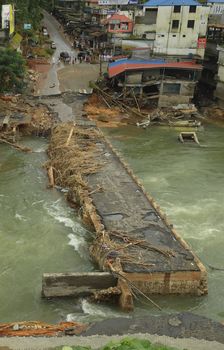The floods have come and gone, leaving in their wake a heap of debris, delirium and despair. However, if we were to train our eyes from the watchtower of optimism, then every disaster offers an ocean of opportunity. With all the controversies surrounding donations, their disbursement and misuse/disuse notwithstanding, the money already in the kitty can be judiciously used to explore new and sustainable methods of development.
The government can start by seriously looking at rebuilding Kerala from scratch. It can look at building new roads, bridges and other public infrastructure that are of international standards and at par with first-world amenities.
China is not too far away to look for models. If one were to put aside petty politics and squabbles based on assumed ideologies, then China’s Belt and Road Initiative has a few lessons to offer. The government, whichever dispensation it may belong to, can create an environment where Malayalis can create valuable and successful businesses that do not depend on donations. This ecosystem can be based on infrastructure development that follows a minimum standard procedure to begin with. This moment has presented us with the best opportunity to salvage Kerala from the scourge of plastic—the bottles, bags and polystyrene wrappings that are blocking our drains and our docks and harbours, not to mention littering our parks and paths.
Yet the disposal of plastic offers one of the most exciting prospects of not only solving the problem but also helping the most vulnerable among us. And this can be easily done by creating and incentivising an army of informal waste-pickers. In exchange for cash from private and government-run companies, internally displaced people who have moved out of flood relief camps to makeshift habitats can collect 150-300 kilos of plastics a week. More than 80 per cent of this secondary raw material can easily be exported to South Asian countries for industrial purposes, or to recycle for use as packaging in cities like Bengaluru, Mumbai and Delhi.
This is how we can see recycling as the right direction for the future. There are more than two million informal waste-pickers around the world, and recycling of waste is now a legitimate global business, with robust international markets, extensive supply and transportation networks, and a rapidly rising international market for secondary raw materials, especially in China. This sector could offer significant economic opportunities for our flood recovery activities, as well as create more jobs and allow inflow of money into the state.
An intensive investment in broadband and turning the state into one big smart city can go a long way in drawing the attention of venture capitalists and startups and those ploughing money into future technologies.
However, modernisation must not be at the cost of the environment. We should plant more coconut trees, areca nut trees, pepper and spice plants as vertical gardens and look at creating forests of deep-rooted trees. At the same time we should protect our mangroves. The ‘Things-to-Do’ list can go on and be as ambitious as it can be. Yet, it goes without saying no project can kickstart itself without planning, vision and meaningful discussions. Silence, of course, should not exist. And no noise, if productive, is loud enough. Just as charity begins at home, it is in our hands, not those of the politicians.
editor@theweek.in


